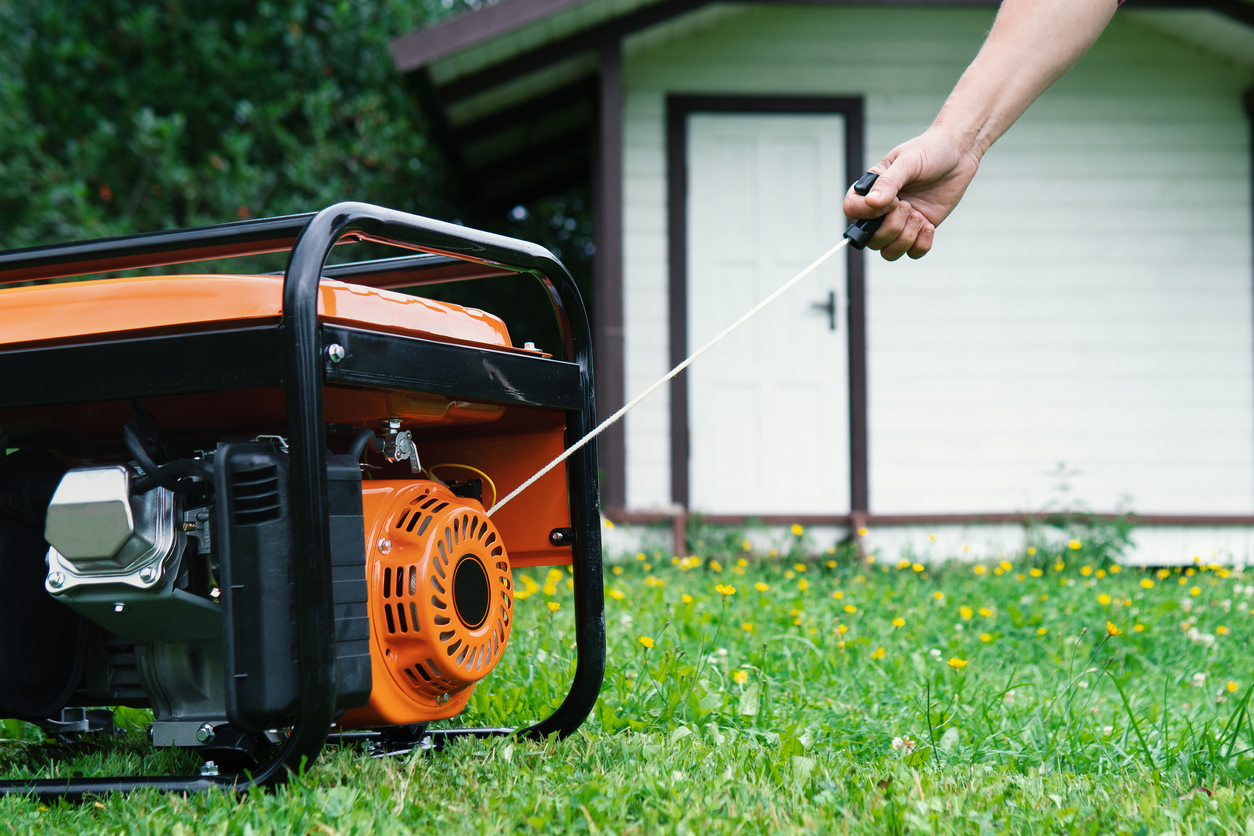
Female hand starts a portable electric generator standing on the grass in front of a summer house in summer evening
Click this link to return to The W Disclosure newsletter.
It’s no secret that weather conditions and extreme weather events continue to wreak havoc in the Bay Area and across the state, resulting in sometimes more frequent and prolonged power outages. Having an alternative energy source gives you peace of mind by ensuring a continued power supply whenever there’s a blackout. A reliable generator enables you to continue running your heating, air conditioning, and other home appliances essential for living in your home safely, especially during extreme weather.
If you’re in the process of buying a home generator, we have put together this quick guide to help you make an informed decision.
Types of Generators
Before we look into the factors you should consider when buying a generator for your home, let’s first discuss the types of generators available. Mainly, there are four options standby, portable, inverter, and solar generators.
Home Standby Generator
Home standby generators start automatically when the power goes out. They provide an added convenience, especially when the power goes out when you’re not at home. Though the generators are more expensive than the portable types, they offer more safety and higher power outputs, mainly between 5,000 and 20,000 watts.
Portable Generator
Portable generators are wheeled units, making them ideal for use in any open space on your property. They produce high levels of carbon monoxide; hence, they should never be used in an enclosed space. Most portable generators supply between 3,000 and 8,500 watts.
Inverter Generator
Inverter generators are also wheeled but have more complex engines that allow them to regulate the power needed by throttling up and down, making them more energy-efficient. They also emit lower levels of carbon monoxide and are less noisy. Inverter generators can supply between 1,500 and 7,600 watts.
Portable Power Stations
Also known as solar generators, portable power stations provide clean energy as they do not require propane or gas. Instead, they charge by plugging into solar panels or electric outlets. These can be safely used in enclosed spaces as they do not have emissions. They’re quieter but provide less power, mainly between 1,200 and 1,500 watts.
Factors to Consider
Some of the most important factors to consider when choosing an ideal generator for your home are type, performance, fuel source, and safety features. Here is a rundown of the features to look out for and why you should consider them.
Safety is of utmost importance. Manufacturers test generators for safety and performance before releasing them into the market. Ensure that a nationally recognized testing laboratory certifies the generator.
Power Requirement
Assess your power needs in case of an outage to determine the size of the generator you need. For instance, you can analyze the power requirements of your most vital devices and appliances as follows:
- Refrigerator – 500 – 1,000 watts
- Laptop – 20 – 75 watts
- Light bulbs – 5 – 80 watts
- Microwave – 600 – 1,500 watts
- Sump pump – 800 – 1,000 watts
- Portable heater – 750 – 1,500 watts
- Water heater – 4,000 – 5,000 watts
- Window air conditioner – 500 – 2,000 watts
- Dryer – 2,000 – 6,000 watts
Fuel Source
Both standby and portable generators can use propane. Portable generators use gasoline, while natural gas is exclusively used in standby models. Solar energy is also a common fuel source but has a much lower power output.
Transfer Switch
Standby generators have pre-installed automatic transfer switches, while there are manual switches that can be used with portable generators. Portable generators mainly run on extension cords, but these are a hazardous option in case of a power overload. The alternative is using a transfer switch, which enables a safe connection to a circuit panel for easy switching between grid and generator power.
Cost
Mainly, the cost depends on the type of generator and the energy output. Standby generators can range between $2,000 and $15,000, while the portable types can cost you between $400 and $6,000.
Automatic CO Shutoff
A generator with an automatic CO shutoff kills the engine when it detects harmful levels of carbon monoxide. Also, be on the lookout for models that have low CO engines.
Fuel Gauge
Some generators have a fuel gauge that allows you to monitor the fuel level. Likewise, some models have low-oil shutoff that kills the engine when the fuel drops below a certain level, so be on the lookout for those as well.
There you have it! Crucial factors to consider when buying a home generator. We hope you’re now more prepped to pick the best unit to keep your home appliances running through power outages.
Click the link here to return to The W Disclosure Newsletter.


 Facebook
Facebook
 X
X
 Pinterest
Pinterest
 Copy Link
Copy Link


